

As a parent to a teenager, you may be interested to read up further to help you understand them and shape their behaviour, through reinforcement and/or punishment.
Parenting Children with Positive Reinforcement (Examples + Charts)
Children don’t come with instructions and discipline is often experienced by parents and children alike as an arena where our will and wits are tested.
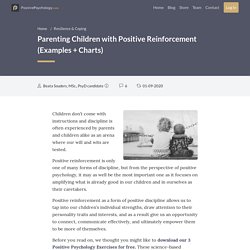
Positive reinforcement is only one of many forms of discipline, but from the perspective of positive psychology, it may as well be the most important one as it focuses on amplifying what is already good in our children and in ourselves as their caretakers. Positive reinforcement as a form of positive discipline allows us to tap into our children’s individual strengths, draw attention to their personality traits and interests, and as a result give us an opportunity to connect, communicate effectively, and ultimately empower them to be more of themselves. Before you read on, we thought you might like to download our 3 Positive Psychology Exercises for free.
You can download the free PDF here. A Look at Parenting with Positive Reinforcement. Physical punishment and why few parents openly admit they cane, smack or spank. SINGAPORE: Everyone has an opinion on everything parenting related: From co-sleeping choices to the intensity of enrichment lessons.
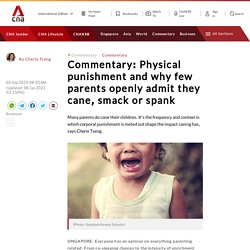
But there are fewer things more divisive – and morbidly fascinating – as the discussion of parenting and discipline, specifically, the relevance and role of physical punishment in disciplining a child. To cane or not to cane, that is the question. Let me draw the battle lines for you. In one camp, which counts popular, modern day literature and research on its side is the “Caning is brutal, archaic and abusive” narrative. An article by the American Psychological Association, tersely titled “the case against spanking” shares that studies have shown physical punishment, including spanking, hitting and other means of causing pain, can lead to increased aggression, anti-social behaviour, physical injury and mental health problems for children. Why Do They Do That? Teenagers & Risky Behaviour - And Why Punishment Won't Work - Hey Sigmund. It’s no secret that there are many intelligent, well-adjusted adolescents who have a self-preservation instinct so small, it could fit through the eye of a needle without any trouble at all.

New research has brought together some of the world’s experts in an attempt to understand what drives the heightened level of risk taking that is so common during adolescence. It’s the same thing that drove us to do crazy stupid things. It’s all in our wiring. Why they do what they do – the research. Discipline: What Parents Get Wrong, and How to Get It Right - Promises Healthcare. Spare the rod and spoil the child – is this a sensible justification for the use of physical punishment in disciplining a child?
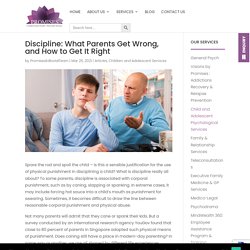
What is discipline really all about? To some parents, discipline is associated with corporal punishment, such as by caning, slapping or spanking. In extreme cases, it may include forcing hot sauce into a child’s mouth as punishment for swearing. Sometimes, it becomes difficult to draw the line between reasonable corporal punishment and physical abuse. Not many parents will admit that they cane or spank their kids. Positive Punishment: What It Is, Benefits, and Examples. Positive punishment is a form of behavior modification.
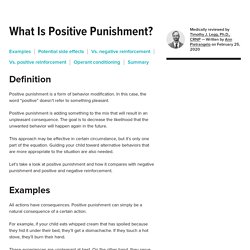
In this case, the word “positive” doesn’t refer to something pleasant. Positive punishment is adding something to the mix that will result in an unpleasant consequence. The goal is to decrease the likelihood that the unwanted behavior will happen again in the future. 7 Ways to Make Grounding Your Teen Effective Discipline. Parents often use grounding as a consequence when teenagers violate a basic family rule—like their curfew.
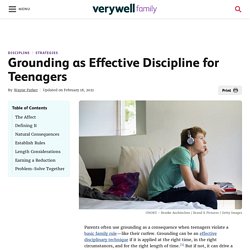
Grounding can be an effective disciplinary technique if it is applied at the right time, in the right circumstances, and for the right length of time.1 But if not, it can drive a wedge between parents and teenagers. Learn how to apply grounding as a consequence. When caning of children becomes abuse: Lawyers explain the legal parameters. SINGAPORE: When Mrs Tan’s son misbehaved when he was younger, he would be put through a "sentencing process" – his offences listed out with the corresponding strokes of the cane and a date set for the painful deed.
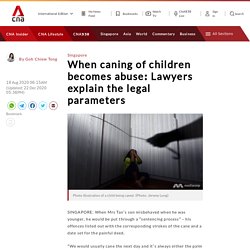
“We would usually cane the next day and it’s always either the palm or the buttocks,” Mrs Tan* told CNA. Delaying the punishment ensured that the caning was done in a “very objective way” and not in the heat of the moment. Why Positive Reinforcement Is Important In EY. Positive reinforcement allows us to use our children’s individual strengths, interests and positive traits.
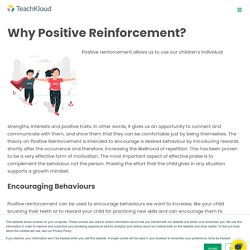
In other words, it gives us an opportunity to connect and communicate with them, and show them that they can be comfortable just by being themselves. The theory on Positive Reinforcement is intended to encourage a desired behaviour by introducing rewards shortly after the occurrence and therefore, increasing the likelihood of repetition. This has been proven to be a very effective form of motivation. The most important aspect of effective praise is to complement the behaviour not the person. Praising the effort that the child gives in any situation supports a growth mindset. Using Positive Reinforcement to Improve Behavior. When your child misbehaves, rewards might be the last thing on your mind.
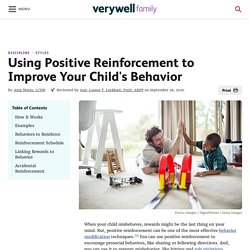
But, positive reinforcement can be one of the most effective behavior modification techniques.1 You can use positive reinforcement to encourage prosocial behaviors, like sharing or following directions. And, you can use it to prevent misbehavior, like hitting and rule violations. Positive reinforcement can also be an effective way to encourage and motivate your child to be responsible, do their chores, get along with their siblings, or complete their homework assignments without arguing. How Positive Reinforcement Works. The value of reinforcing positive behaviour for our teens. As children approach adolescence, they sometimes begin testing limits, bending the rules and otherwise going against the grain.
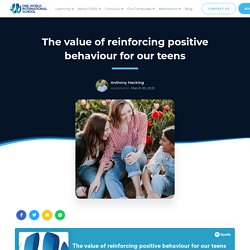
While this is normal behaviour for teens, it can be incredibly trying for you, as a parent. Teenagers may also be dealing with the stresses that come with trying to fit in with their peers and assert their growing independence. What kind of discipline works for teens? The teen years are notoriously challenging for parents. Much like the toddler years, kids sometimes seem intent on doing exactly the opposite of what we ask.
And for some of the same reasons: Their job now is to find their sea legs as a person, to shape an identity, to sort out what's important to them. Their integrity would be compromised by simply doing what we ask because we ask it. They need to believe it's the right thing for THEM. Gaming Addiction: What It Is and How Can You Self-Regulate? - Promises Healthcare. Predictive algorithms, the creation of alternate realities in which we are unlimited by the constraints of the real world we live in – such methods are extensively practiced by the gaming industry to draw players in.
Gaming is undeniably a popular and widely-adopted mode of de-stressing, but how much is too much? In May 2019, the World Health Organisation officially recognised “gaming addiction” as a mental health condition. More people in Singapore seeking help for gaming addiction. Support Groups for Parents of Troubled Teens. When most people think of support groups, groups like Alcoholics Anonymous (AA) might be the first thing that comes to mind. But there are many other groups that exist to help people dealing with a variety of issues—including raising troubled teens. A parenting support group can provide comfort and advice from others in the same situation.
These groups are available in most communities as well as online. How Support Groups Help Initially, it may be difficult to understand the point of participating in a support group. Ministry of Social and Family Development. The Enhanced STEP-UP (School Social Work To Empower Pupils to Utilise their Potential) (ESU) is a 12-month support programme provided by Integrated Service Providers (ISPs).
Designed to reach out to students who are at risk of dropping out of school or youth who are already out of school, ESU aims for the youth to either: Remain in or return to school, orBe engaged in work skills training/employment The programme may be extended for an additional 12 months, depending on the needs of the client. To be eligible for ESU, the child/youth must be: Singaporean citizen/PR below 21 years oldStudent in a MOE school/ITE with an absenteeism rate of 20% or moreNot in Time-Out Programme or any other MSF-funded programmesNot be under a Court Order.
Parenting Programmes to Equip Parents. 10 Parenting Support Providers (PSPs) were appointed by the Ministry of Social and Family Development (MSF) to deliver parenting support services on a regional basis. PSPs work closely with schools and community partners in their allocated regions to support parents through evidence-based parenting programmes and referrals to services depending on parents’ needs. The PSPs offer 2 evidence-based programmes – Positive Parenting Program (Triple P) and Signposts. To sign up, parents may contact the PSPs serving their child’s school or their region or approach the child’s school Teacher-In-Charge of Parenting Programmes. About the Positive Parenting Program (Triple P) TOUCH Parenting Homepage. Communicating with schools through Parent Support Groups. Child Guidance Clinic. Respectful/Mindful Parenting Singapore Public Group.